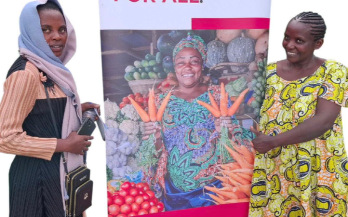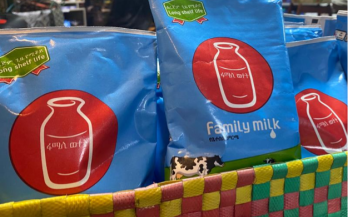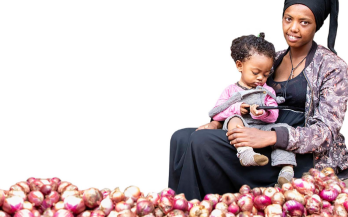- 15/05/2025
The Global Alliance for Improved Nutrition (GAIN) and Wellspring Development designed and hosted a series of in-person and online consultations with partners of the Dutch Ministry of Foreign Affairs to examine challenges in improved the quality of the diets of population groups living in rural areas of Low and Lower-Middle Income countries. These groups still largely consume unhealthy or even nutrient inadequate diets and face heavy burdens of malnutrition. This fourth paper looks specifically at the challenges of delivering impact at scale. The aim of the discussions was to gather examples of successful project interventions, to understand the decision processes of different organisations,
- 15/05/2025
The Global Alliance for Improved Nutrition (GAIN) and Wellspring Development designed and hosted a series of in-person and online consultations with partners of the Dutch Ministry of Foreign Affairs to examine challenges in improving the quality of diets of population groups living in rural areas of Low and Lower-Middle Income countries. These groups still largely consume nutrient-inadequate, even unhealthy, diets and face heavy burdens of malnutrition. This third paper out of six, looks specifically at the role of markets in improving nutrition at scale. The aim of the discussions was to gather examples of projects that have delivered success at scale, to understand the challenges involved and to identify important points of convergence in conceptualisation and action in future work.
- 15/05/2025
The Global Alliance for Improved Nutrition (GAIN) and Wellspring Development designed and hosted a series of in-person and online consultations with partners of the Dutch Ministry of Foreign Affairs to examine challenges in improving the quality of diets of population groups living in rural areas of Low and Lower-Middle Income countries. These groups largely consume nutrient-inadequate, even unhealthy, diets and face heavy burdens of malnutrition. This second paper, out of six, looks specifically at the challenges of defining and understanding different groups of rural populations. The aim of the discussions was to explore a range of approaches used in defining segments and implications of chosen segments for programme design to help the organisations involved understand how to incorporate these ideas in future work. The bulk of the discussion reflected in this paper is from an online meeting held on 30 September 2024, with the participation of the Dutch Ministry of Foreign Affairs, Bopinc, CARE Netherlands, East-West Seeds, GIZ, the Netherlands Food Partnership, One Acre Fund, and the Wageningen Centre for Development Innovation.
- 15/05/2025
The Global Alliance for Improved Nutrition (GAIN) and Wellspring Development designed
and hosted a series of in-person and online consultations with partners of the Dutch
Ministry of Foreign Affairs to examine challenges in improving the quality of diets of
population groups living in rural areas of low- and lower-middle-income countries. These
groups largely consume nutrient-inadequate, even unhealthy, diets and face heavy
burdens of malnutrition. This first paper, out of six, looks specifically at the challenges of
setting targets for dietary quality improvement. The aim of the discussions was to gather
examples of successful project interventions at scale, to understand the decision
processes of different organisations, and to identify important points of convergence in
conceptualisation and action.
- 15/05/2025
Improving the quality of diets for rural populations is a key priority for many organisations – such as donors, implementing NGOs, and governments – in the nutrition sector. However, success at scale has been elusive.
GAIN, with the support of the Dutch Ministry of Foreign Affairs, embarked on a project to improve understanding of how to succeed at scale in rural settings. Eight other organisations (see background) also joined in this effort to pool their knowledge and experiences. Wellspring carried out a literature review in April-May 2024 and facilitated an in-person workshop in Utrecht in May 2024. This was followed by six online calls that focused on deeper discussion on six key topics identified based on the learning until then: dietary quality; segmentation; markets; scale; orchestration; and trade-offs.
Each topic has been covered under a separate GAIN convening paper. This overview aims to provide a short summary of each of the six topics.
- 06/05/2025
Dairy products are rich in many nutrients essential for healthy growth and development, and they are often more affordable than other animal-source foods. Ethiopia has a very large stock of dairy animals, and milk and other dairy products are popular in the local food culture. Yet the per capita consumption of dairy is surprisingly low, reflecting numerous challenges in production, distribution, and household behaviours. This Working Paper reviews the experience of GAIN Ethiopia tackling some of these challenges in the dairy value chain.
- 25/04/2025
This brief aims to
1. Describe the micronutrient malnutrition and LSFF programme context in Rwanda;
2. Identify challenges and opportunities to strengthen existing programs;
3. Provide practical, evidence-informed policy and programmatic recommendations; and
4. Catalyse multi-stakeholder collaboration to reduce micronutrient deficiencies.
- 23/04/2025
Milk is a commonly consumed food in Low- and Lower-Middle Income Countries (LLMICS). It contains many important nutrients and generally appears, together with its derived products, in national dietary guidelines. But objections have been raised to its promotion on several grounds: health, environmental, animal welfare, and affordability. This Discussion Paper reviews commonly presented arguments in favour of and against consumption of dairy, taking into account the specific contexts of LLMICs.
- 22/04/2025
These fact sheets look at the roles that can be played by different stakeholders seeking to improve food systems and nutrition in Ethiopia.
• Stakeholders from diverse groups have a role to play in transforming Ethiopia’s food system to address complex challenges arising across the supply chain that contribute to food insecurity and malnutrition.
• Each stakeholder group must take steps towards enhancing collaboration, aligning efforts, and working to deliver a more sustainable and resilient food system for the country.
• Key recommendations include strengthening government commitment, mobilising financial and technical resources, building capacity across different groups, setting up accountability mechanisms, boosting inclusivity of decision-making processes, leveraging technology and innovation, and conducting periodic assessments to identify emerging challenges and opportunities.
- 10/04/2025
While there is a growing recognition of the importance of youth engagement in food system decision-making and governance, existing research remains largely theoretical or anecdotal, with a scarcity of empirical studies providing robust data on the engagement and meaningful participation of young people in food systems. A first step towards providing such data is having strong, validated metrics and data-collection methods that can be applied comparably across contexts. This scoping review thus synthesises evidence on metrics and methods used to assess youth engagement in policy processes, with a specific focus on food system-related policies.









